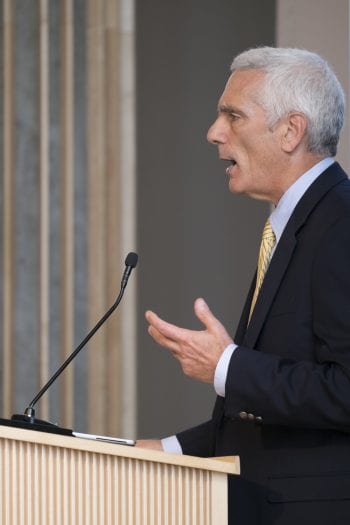More than 250 experts, advocates, and leading academics from all over the United States converged this week on the Brown School of Social Work at Washington University in St. Louis to outline a comprehensive range of solutions to some of the most pressing issues facing the nation and the next administration. 
The conference, “Social Innovation for America’s Renewal,” and its workgroups have developed evidence-based policy recommendations for the 12 Grand Challenges identified by the American Academy of Society Work & Social Welfare (AASWSW).
More than 50 tested policy recommendations have been proposed to address such Grand Challenges as stopping family violence, reducing extreme economic inequality, advancing long and productive lives, and promoting smart decarceration, among others. Together, the 12 Grand Challenges focus on improving individual and family well-being, strengthening the social fabric, and helping to create a more just society.
Mark H. Greenberg, acting assistant secretary at the U.S. Department of Health and Human Service’s Administration for Children and Families, addressed the conference Friday morning. “Your effort is important because it’s precisely what academia, policymakers and practitioners should be doing more of—coming together to identify grand challenges, help people understand them, and point help point the way to solutions,” Greenberg said.
He noted that a number of the Grand Challenges policy recommendations highlight the importance of evidence-based practices. While he agrees, he advised some caution.
“We also need to ensure that being evidence-based is not the enemy of innovation,” Greenberg said. Only a small fraction of the questions policy officials and administrators face each day can be answered by research findings, he said. “Much of our status-quo isn’t evidence-based, and we shouldn’t place unreasonable evidence burdens on the advocates for change,” he said.
‘BREAKING DOWN OPPORTUNITY BARRIERS’
Jared Bernstein, former economic adviser to Vice President Joe Biden and senior fellow at the Center on Budget and Policy Priorities, said meeting the 12 Challenges is “going to take paying attention to the macroeconomy.”
“When the macroeconomy is pushing in the right direction,” he said, “our work becomes a lot easier.”
How do the Grand Challenges get where they need to go? It won’t be easy, he said, calling the current state of federal politics “dysfunction junction.” To break through, “it’s got to be bottom up meets top down,” he said, and the key is reestablishing government as a functional institution.
“Political dysfunction is a very pointed strategy by deeply financed forces who want to disparage government” so they can reap big tax breaks, Bernstein said.
“Framing [the Grand Challenges] as breaking down opportunity barriers strikes me as the way to get it done,” he added.
U.S. Sen. Claire McCaskill (D-Missouri) provided a video to welcome and encourage attendees.
“This conference is very much oriented toward getting ideas and evidence out into the world,” said Michael Sherraden, PhD, director of the Center for Social Development and the George Warren Brown Distinguished University Professor at the Brown School. “In each group, there are people who have been working in these areas for most of their career. Our experience is when you have good evidence it’s much easier to have a productive discussion about policy.”
AASWSW President Richard P. Barth, PhD, said he is excited about the timing of the Grand Challenges. “People seem to understand now how important the social environment is,” he said. Barth is dean of the University of Maryland School of Social Work.
Brown School Dean Mary M. McKay said, “This isn’t a conference that is passive. It’s an active working meeting.” She urged participants to partner with communications experts and to consider how to more effectively and rapidly translate research findings.
“In order to accomplish these Grand Challenges, we’re going to have to up our game,” said Angelo McClain, chief executive officer of the National Association of Social Workers (NASW). The Grand Challenges initiative is an opportunity for social workers to have a great collective impact, he said. “We can do far, far more together than we can think about doing on our own.”
NASW President Darrell P. Wheeler also spoke at the conference, during the dinner for the Grand Challenge Network Groups on September 14.
CONFERENCE PHOTOS
If you would like to view photos of the conference, please click here.
CONFERENCE SPONSORS
Major institutional sponsors of the conference include the American Academy of Social Work & Social Welfare, Washington University in St. Louis, Brookings Institution, Society for Social Work and Research, Fund for Social Policy Education and Practice, and the Federal Reserve Bank of St. Louis.
University schools of social work sponsors include the following: Washington University in St. Louis, George Warren Brown School of Social Work; University of Southern California, School of Social Work; University of Washington, School of Social Work; University of Chicago, School of Social Service Administration; University of Texas at Austin, School of Social Work; University of Maryland, School of Social Work; University of Denver, Graduate School of Social Work; University of Michigan, School of Social Work; Boston University, School of Social Work; University of Pennsylvania, School of Social Policy & Practice; Boston College, School of Social Work.